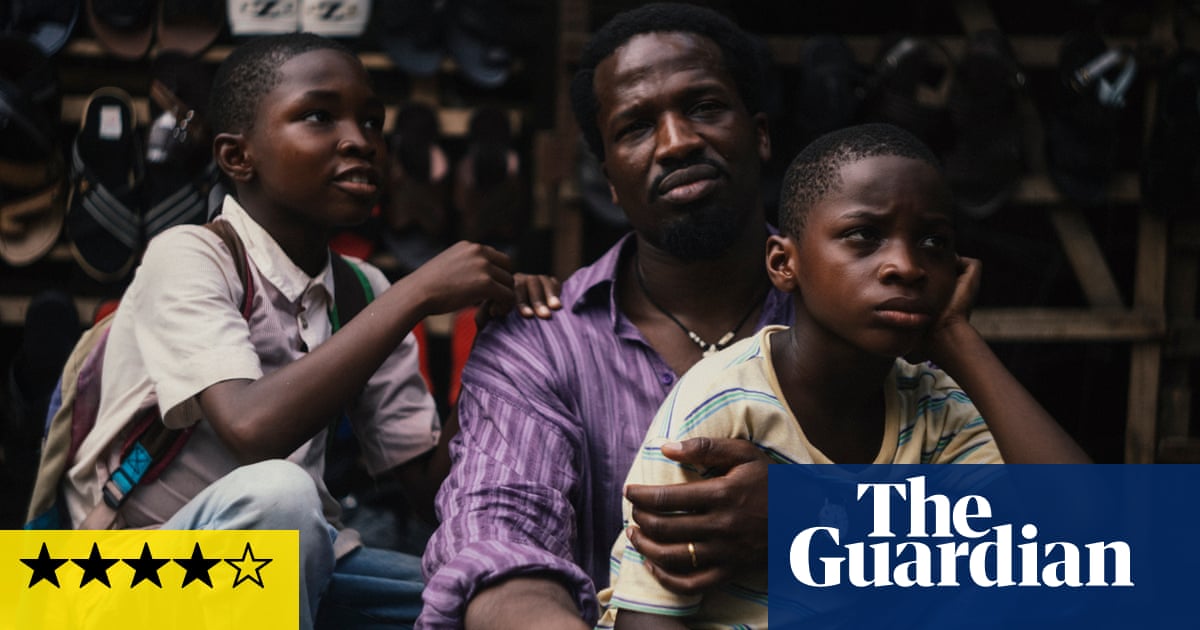Once upon a time in Lagos might be an alternative title for this fervent and vividly intense child’s-eye-view movie from first-time film-maker Akinola Davies Jr. It’s a transparently personal project and a coming-of-age film in its (traumatised) way, a moving account of how, just for one day, two young boys glimpse the real life and real history of their father who has been mostly absent for much of their lives – and how they come to love and understand him just at the moment when they come to see his flaws and his weaknesses.
It is 1993 inNigeria, a tense time with the country on the edge of disorder due to the imminent presidential election, the first since a military takeover 10 years previously. In a remote village far from Lagos, two young boys (played by bright-spark newcomers Godwin Chimerie Egbo and Chibiuke Marvellous Egbo) are awed at the sudden reappearance of their father, Fola, played by Sope Dirisu, who makes no explanation or apology for having been away for so long on business in Lagos, or for appearing now unannounced. He is a handsome, charismatic, commanding man to whom they make the instant obedient responses “Yes, daddy” and “No, daddy”.
Their father demands to know what has happened to his watch and have the boys been touching his possessions in the parental bedroom? (We are to glimpse that watch in the film’s final moments.) And then he announces he must return to Lagos immediately, without waiting for their mother to return from shopping – and on a mysterious whim, says that the boys may on this occasion accompany him.
What happens next is both an increasingly significant quest and bonding experience for father and sons as they struggle to get to the teeming capital on a bus with no petrol, and then by hitching a bumpy ride on a truck. Fola is on a desperate mission to reclaim four months’ worth of unpaid wages before what he clearly expects will be a complete breakdown of law and order connected with with this election.
The boys watch with bewildered quiet as their dad greets men they have never seen before and who nickname Fola “kapo” or “boss” – and they are commanded to greet a quasi-uncle with much politeness – yet the exact person who can get Fola his money is never around. Fola is under pressure, subdued, suffering unexplained nosebleeds. Yet this frustrating delay gives the three of them a kind of breathing space to get to know each other. Fola points out the city’s handsome national theatre building where he says their mother used to spend all her time and money as a young woman. She was theatre-mad, they now discover. The kids had no idea. How could they?
Fola also points out polo ponies in the street, belonging to Nigeria’s wealthy classes. He takes them to a bar where he regales them with magical memories of falling in love with their mother – but also exchanges significant looks with a waitress. He takes them to the beach where he talks about the importance of providing for your family: that is what a man does, and it is what he himself has to do, with these unpaid wages, right now. And all the time, the boys are struck by the thousands of people and the thousands of faces which Davies shoots in looming closeup – especially the soldiers’ impassive, intimidating faces.
What his older son says to Fola is that his mother explained Fola was absent from them, because he needed to earn money – because he loved them, in fact. And God himself was nowhere to be seen and God loved them. So is absence the same thing as love? It is an artless, heartbreakingly unanswered question which is to dominate the tone of this engrossing film. Is absence love? Will we all feel love for someone most intensely when they are overtaken by the ultimate absence of death? It is a rich, heartfelt and rewarding movie.
My Father’s Shadow screened at theCannes film festival.
